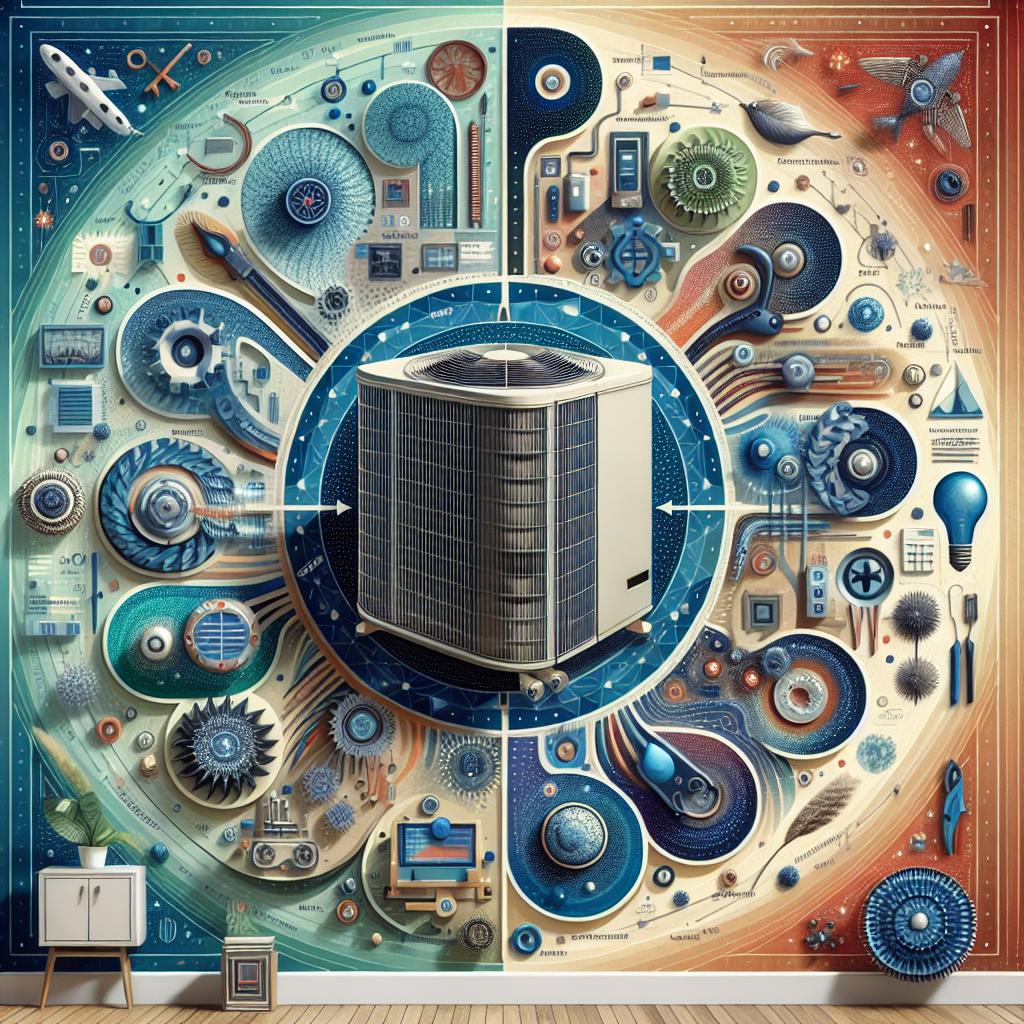When the temperature rises or plunges, ensuring your home remains a haven of comfort often falls to an unsung hero: the HVAC system. Yet, as much as we depend on these intricate machines to regulate our indoor climate, many homeowners find themselves in the dark when it comes to understanding the costs associated with keeping them in peak condition. How much does it truly cost to service an HVAC system? The answer might surprise you. In this article, we’ll explore the various factors that influence HVAC service costs, from routine maintenance to unexpected repairs, and provide you with insights to help you budget effectively for the comfort of your sanctuary. Whether you’re a seasoned homeowner or navigating the world of HVAC for the first time, understanding these costs is essential for effective home management and long-term efficiency.
Understanding the Factors Influencing HVAC Service Costs
When assessing the costs associated with HVAC services, several essential factors come into play. These include the type of HVAC system you have installed, the frequency of maintenance, and any necessary repairs or replacements. Each system may have distinct service requirements that can influence both time and labor costs significantly. Moreover, local market conditions often dictate the rates charged by service professionals, as well as seasonal demands that can fluctuate prices throughout the year.
Additionally, the age and condition of your HVAC system can impact service costs. Older systems often require more frequent and costly repairs, while newer systems may benefit from warranties that minimize out-of-pocket expenses. Don’t forget to consider the skill level of the technician; certified and experienced professionals may charge a premium for their expertise. Here is a quick overview of key variables affecting your HVAC service costs:
| Factor | Impact on Cost |
|---|---|
| System Type | Varies by complexity |
| Maintenance Frequency | Regular vs. sporadic |
| Local Labor Rates | Market-driven |
| Technician Experience | Higher rates for expertise |
| System Age | Possible higher repair costs |

Breaking Down Typical Service Charges and Expenses
When analyzing the costs associated with servicing an HVAC system, it’s essential to account for both regular service charges and potential additional expenses. Routine maintenance often includes tasks such as cleaning coils, checking refrigerant levels, and inspecting electrical components. Homeowners can expect these standard service visits to range from $75 to $150, depending on their location and the HVAC technician’s expertise. Additionally, factors such as system age, type, and seasonal demand may influence pricing. Some common expenses to consider are:
- Diagnostic Fees: Typically between $50 and $100, applicable if the technician has to identify issues during the maintenance visit.
- Parts Replacement: Costs can vary widely, with common part replacements (like filters, capacitors, or compressors) costing anywhere from $30 to $1,200.
- Emergency Service Fees: If HVAC systems fail outside regular hours, emergency calls can incur charges of $100 to $300 or more.
In addition, many service providers offer annual maintenance plans that can significantly reduce costs for regular upkeep. These packages often come with benefits like priority service and discounted repairs, making them a smart choice for homeowners looking to mitigate unforeseen expenses. Below is a simple breakdown of typical pricing categories associated with HVAC services:
| Service Type | Average Cost |
|---|---|
| Routine Maintenance | $75 – $150 |
| Diagnostic Fee | $50 – $100 |
| Parts Replacement | $30 – $1,200 |
| Emergency Service | $100 – $300 |
| Annual Maintenance Plan | $150 – $500 |

Exploring Preventive Maintenance as a Cost-Effective Strategy
Preventive maintenance offers a proactive approach to HVAC servicing that not only extends the lifespan of your system but also enhances its efficiency, ultimately resulting in cost savings. When you regularly schedule checks and maintenance for your HVAC units, you can address potential issues before they escalate into costly repairs. By investing in routine tasks such as filter replacement, coil cleaning, and system inspections, homeowners can maintain optimal performance levels, reducing energy consumption and lowering utility bills over time.
Below is a table comparing the typical costs associated with preventive maintenance versus emergency repairs for HVAC systems:
| Type of Service | Average Cost | Frequency |
|---|---|---|
| Preventive Maintenance | $150 – $300 | Bi-annual |
| Emergency Repairs | $500 – $1,500+ | As needed |
By prioritizing preventive measures, property owners can avoid the high costs associated with emergency repairs or system replacements, creating a more sustainable budget for HVAC upkeep. This strategy not only fortifies the reliability of your heating and cooling systems but also translates to peace of mind, knowing that your home environment remains comfortable without unplanned financial stress.

Making Informed Choices: Hiring the Right HVAC Technician
Choosing the right HVAC technician is crucial for ensuring that your system operates efficiently and lasts for years. When seeking a technician, consider their credentials and experience. Look for a certified professional who has undergone training and has a proven track record in the industry. Additionally, inquire about their specialization; some technicians may focus on residential systems while others are more experienced in commercial applications. You can also ask for recommendations from friends or family, as personal experiences are often valuable indicators of a technician’s reliability and service quality.
Another important factor is understanding the cost structure of HVAC services. A reputable technician should provide a clear estimation of costs involved, which may vary based on the complexity of the service required. Here’s a simple table to illustrate average service costs:
| Service Type | Average Cost ($) |
|---|---|
| Annual Maintenance Check | 100 – 200 |
| Refrigerant Recharge | 150 – 300 |
| Furnace Repair | 200 – 600 |
| AC Unit Installation | 3,000 - 7,500 |
Additionally, always ensure to discuss any warranties or guarantees on the work performed. A technician who stands behind their work demonstrates confidence and professionalism, giving you peace of mind in your investment. Always request detailed documentation of work done and any parts replaced to keep a record for future reference.
Q&A
Q&A: How Much Does It Cost to Service an HVAC?
Q: What is HVAC servicing?
A: HVAC servicing refers to the regular maintenance and checks performed on heating, ventilation, and air conditioning systems to ensure they operate efficiently and effectively. This can include cleaning filters, checking refrigerant levels, inspecting ductwork, and more.
Q: Why is it important to service my HVAC system?
A: Regular servicing of your HVAC system is crucial for several reasons. It helps extend the lifespan of the equipment, improves energy efficiency, and can prevent costly repairs by catching issues before they become major problems. Plus, a well-maintained system contributes to better indoor air quality.
Q: How much can I expect to pay for HVAC servicing?
A: The cost of HVAC servicing can vary widely based on factors such as the type of system, size, and location. On average, homeowners can expect to pay between $100 and $300 for a standard service visit. General maintenance plans, which might include multiple visits throughout the year, can range from $150 to $500 annually.
Q: Are there additional costs involved?
A: Yes, there can be additional costs if repairs or extra services are needed. For example, replacing a worn-out part or cleaning ductwork can add $50 to $250 or more to the total bill. It’s always a good idea to ask for a complete breakdown of potential costs before the service begins.
Q: Does the season affect HVAC service costs?
A: Absolutely! Demand for HVAC servicing often spikes in the summer and winter months. During peak seasons, service providers may charge higher rates, or it may take longer to get an appointment. Scheduling maintenance in the shoulder seasons (spring and fall) can often yield better pricing and service availability.
Q: How can I ensure I get a fair price for HVAC servicing?
A: To ensure you are getting a fair deal, it is wise to shop around. Get quotes from multiple service providers and check their credentials and reviews. Additionally, look for maintenance plans that come with perks like discounts on repairs or priority service.
Q: Are there any DIY maintenance tips that can save me money?
A: Certainly! Homeowners can save on servicing costs by performing simple maintenance tasks. Regularly replace or clean air filters, clear debris from around outdoor units, and keep vents unobstructed to improve air circulation. While these tasks are manageable, always consult a professional for more complex issues.
Q: What should I look for in a good HVAC service provider?
A: A good HVAC service provider should have proper licensing, insurance, and experience. Look for customer reviews and testimonials to gauge their reliability and customer service. A reputable technician will provide clear explanations of their services and maintain transparent pricing.
Q: Is HVAC servicing a necessary expense?
A: While it may seem like an added expense, regular HVAC servicing can ultimately save you money by improving efficiency and preventing expensive breakdowns. Think of it as an investment in your home’s comfort and your system’s longevity.
Q: When should I schedule my HVAC service?
A: Ideally, schedule your HVAC service at least twice a year—once in the spring and once in the fall. This will prepare your system for the upcoming heating or cooling season and ensure it’s functioning at its best when you need it most.
Concluding Remarks
understanding the costs associated with servicing an HVAC system is essential for every homeowner. By arming yourself with knowledge about potential expenses, from routine maintenance to unexpected repairs, you can better plan and budget for this vital aspect of homeownership. Whether you choose to DIY, schedule regular check-ups, or call in the professionals for more complex issues, being informed empowers you to make the best decisions for your comfort and efficiency. Ultimately, a well-maintained HVAC system not only enhances your indoor environment but can also lead to savings in energy costs in the long run. So, as you navigate the world of HVAC services, remember that a little forethought can go a long way in ensuring your home remains a haven, regardless of the season.

